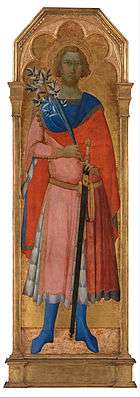Victor and Corona
| Saints Victor and Corona | |
|---|---|
|
Illuminated miniature of the martyrdom of Saints Victor and Corona, on a full leaf from a Book of Hours, France (Paris), ca. 1480. | |
| Martyrs | |
| Died | ~170 AD |
| Venerated in | Roman Catholic Church |
| Feast | 14 May |
| Patronage | Feltre; Castelfidardo; Corona is invoked in connection with superstitions involving money, such as gambling or treasure hunting |


Saints Victor and Corona are two Christian martyrs. Most sources state that they were killed in Roman Syria during the reign of Marcus Aurelius (170s AD). However, various hagiographical texts disagree about the site of their martyrdom, with some stating that it was Damascus, while Coptic sources state that it was Antioch. Some Western sources state that Alexandria or Sicily was their place of martyrdom. They also disagree about the date of their martyrdom. They may have been martyred during the reign of Antoninus, Diocletian, while the Roman Martyrology states that it was in the third century when they met their death.[1]
Legend
Their legend states that Victor was a Roman soldier of Italian ancestry, serving in the city of Damascus in Roman Syria during the reign of Emperor Antoninus Pius. He was tortured -including having his eyes gouged out- by a commander named Sebastian.
While he was suffering from these tortures, the sixteen-year-old spouse of one of his brothers-in-arms, named Corona,[2] comforted and encouraged him. For this, she was arrested and interrogated. According to the passio of Corona, which is considered largely fictional, Corona was bound to two bent palm trees and torn apart as the trunks were released.
Victor was beheaded in Damascus in 160 AD.
Other sources state that they were husband and wife.[3]
Veneration
Victor and Corona's memorial day is 24 November (11 November in the Orthodox church calendar). Their feast day is 14 May. Outside the town of Feltre on the slopes of Mount Miesna is the church of SS. Vittore e Corona, erected by the Crusaders from Feltre after the First Crusade.
Corona is especially venerated in Austria and eastern Bavaria. She is invoked in connection with superstitions involving money, such as gambling or treasure hunting.
Otto III, around AD 1000, brought Corona's relics to Aachen.
Notes
- ↑ Santi Vittore e Corona
- ↑ Also known as Stefania, Stephana, a Greek translation of her Latin name, meaning "crown"
- ↑ Saint Patrick's Church: Saints of May 14
External links
- (Italian) Santi Corona e Vittore.
- Saints of the Day for May 14 St Patrick Church website (Washington, DC).
- (Italian) Basilica Santuario dei Santi Vittore e Corona.
- St. Victor of Damascus at the Greek Orthodox Archdiocese of America
- Selected Lives of Saints of November and December
